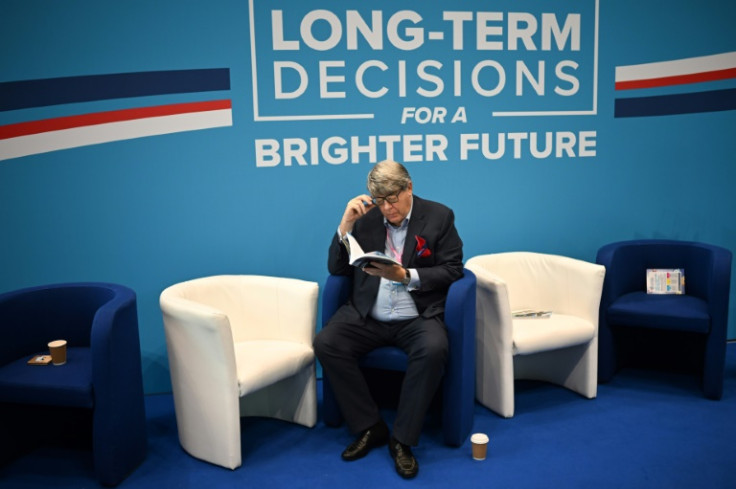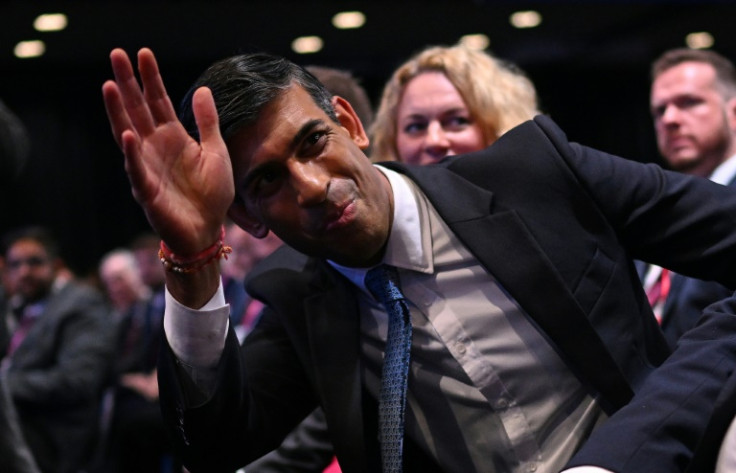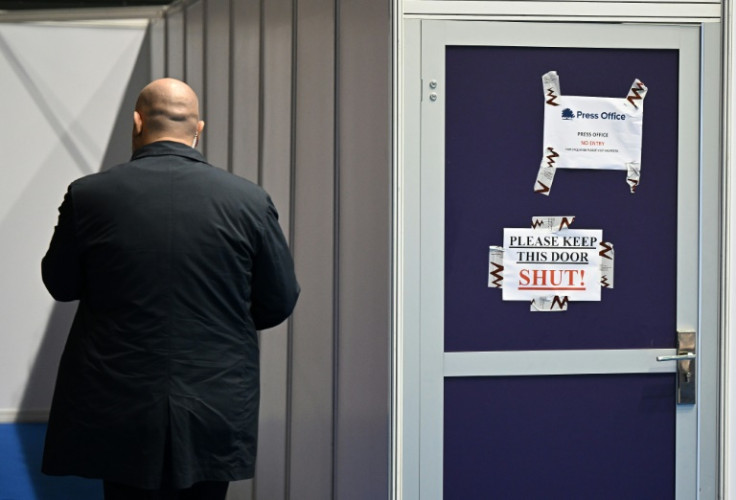Tory Activists Still Harbour Hopes As UK Election Looms

Britain's grassroots Conservatives braving national railway strikes and the Manchester rain to attend their party's annual conference appeared pragmatic Monday about the electoral realities they face.
But delegates in the northwestern English city for the yearly gathering were convinced Prime Minister Rishi Sunak could still reverse their fortunes, arguing voters still seem unconvinced by rival Labour leader Keir Starmer.
After 13 years in power -- under five different leaders -- the Conservatives find themselves well behind the opposition party, following multiple scandals under ex-prime minister Boris Johnson and widespread economic woes.
"We're all aware we have a hill to climb for the election next year," said Michael Gibson, 58, an ex-councillor in southern England, shopping for a sweater in the gift shop for a friend whose attendance was scuppered by the rail strikes.
"But a year is a long time in politics," Gibson added, noting there was a "positive mood" in Manchester and newly forged determination within the party ahead of the contest after almost a year of Sunak's leadership.
"I've seen cycles like this go on before, I've been an activist for 40 years," said the greying grassroots veteran.
Sunak will close the conference with a keynote speech Wednesday, seen by some as the starting gun for the election he must hold by January 2025 at the latest.
After 11 months adopting a largely managerial governing style, Sunak has in recent weeks appeared to shift into more of a campaigning footing.
He has made a series of policy announcements and pivots seemingly intended to draw dividing lines with Labour.
For conference attendee Mark McGregor, 62, a director of a communications firm, there is still time for a turnaround, "just not that much".
"There is a way for the Conservatives to win", he added, while conceding "it's not very likely".
McGregor compared the situation favourably with the mid-1990s, when the party had been in power for a decade and a half and were ousted in a landslide win for Tony Blair's rebranded New Labour party.
"The one salvation for the conservatives (is) it's not like 1997," he said, adding Blair was viewed as "a very different sort of Labour leader" to Starmer.
"Their lead is really built on the distrust of the Conservatives," he said of the opposition.
"Can we get that back? Maybe."
Conservative MP Graham Brady, a senior backbencher, echoed the view that the party does not necessarily face the same dire fate as in 1997.
He pointed to several recent opinion polls showing the race with Labour tightening from the wide margins seen earlier this year -- to 10 percentage points in one weekend survey.
"It's still a very significant lead, and that's the challenge we face this week and next year," he told AFP on the sidelines of the conference.
"It's clear that it can be done. There's no enthusiasm for Keir Starmer whatsoever and the Labour party at the moment... so it feels eminently possible."
Others in the grassroots appear to agree, but remain cautious.
Student Molly Ashman, 19, described the mood on the second day of the conference as "very vibrant" and the party faithful as "feeling very uplifted".
"It's the closest gap that we've had in a year with Labour," she said, predicting "Rishi Sunak will come out on top".
However, the conference risks being overshadowed by his government scrapping a planned section of a new high-speed rail line between Birmingham and Manchester.
Several British media outlets reported Monday that the leg between the two cities -- a key pledge to help "level up" northern England -- would be axed, but the government denied a decision had been made.
Emmanuel Finndoro-Obasi, chairman of the Conservatives' Friends of Nigeria and Friends of the Commonwealth groups, said he wanted Sunak to get the HS2 project "back on track".
"We have to keep the promise we made to the people of UK," he added.


© Copyright AFP 2024. All rights reserved.











